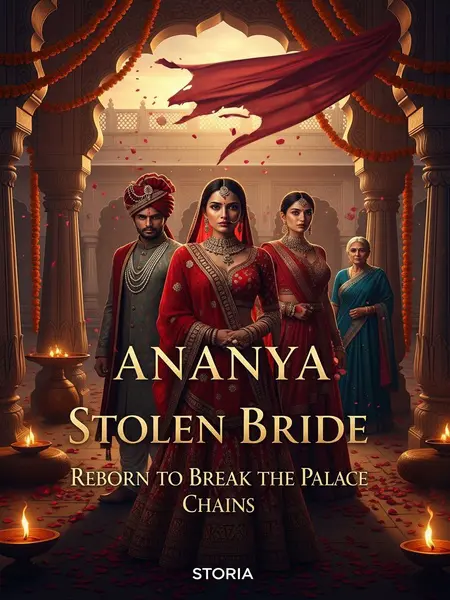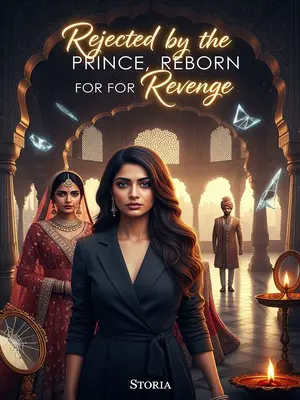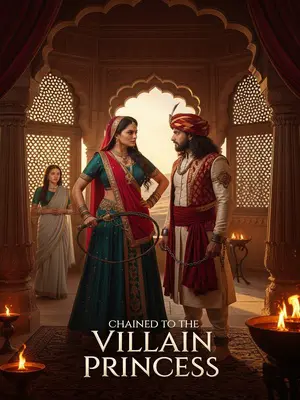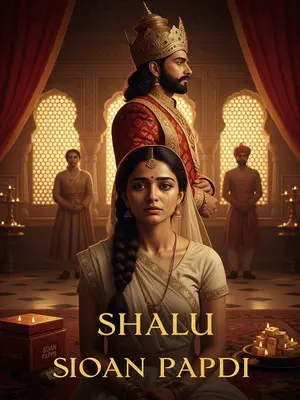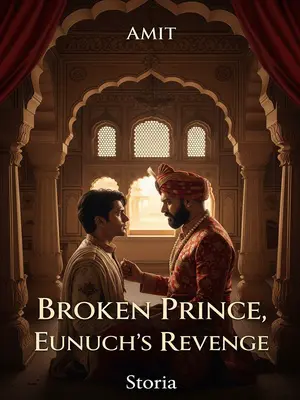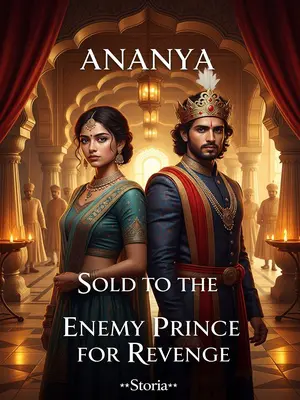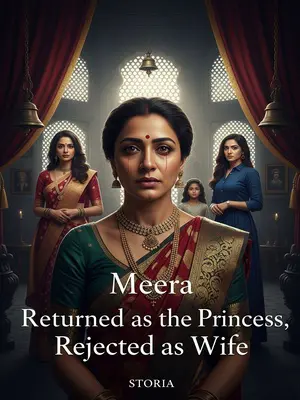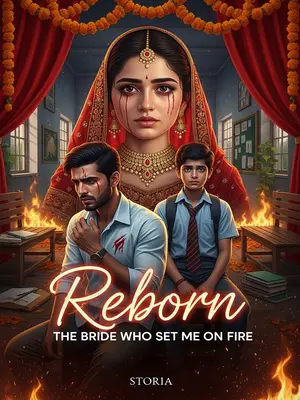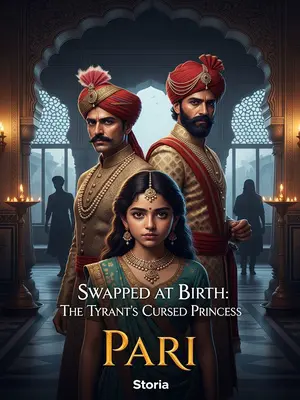Chapter 2: Bazaars, Betrayals, and the Blue Palki
Two days later, the streets of Rajpur bustled as always.
Rickshaw pullers called out for fares, street vendors sold hot samosas and sweet jalebis, and the air was thick with the smell of diesel, roasting peanuts, and sweat. A cluster of schoolchildren ran past me, laughing, one clutching a leaking tiffin. The familiar chaos was oddly comforting.
I went out to shop as usual, but was stopped on the road by the Yuvraj, who had just left the palace.
The palace guards tried to clear a path, their voices sharp: "Hath hatao! Yuvraj-sa is coming!" A few curious onlookers paused, straining for a glimpse of royal drama. My heart stuttered at the sight of him—a presence that never quite faded, even with time.
He pulled his reins and leapt off his horse in one smooth motion, as elegant and handsome as ever.
His uniform, pressed and glinting with medals, drew stares from the crowd. The horse, a chestnut stallion, pawed the ground restlessly. Even amidst the hubbub, the Yuvraj’s arrival felt like the scene-stealer in an old Raj Kapoor film.
But his brows were furrowed, and his voice was cold:
“I heard you requested a marriage decree?”
A group of shopkeepers nearby exchanged looks; someone muttered under their breath, “Shaadi ka mamla hai, lagta hai.” The Yuvraj’s voice cut through the chatter like a blade.
“Ananya, are you really so impatient?”
I flinched at the harshness, feeling the heat of the crowd’s gaze burning my skin, the itch of sweat under my dupatta, the sting of old memories rising with each word. My cheeks burned, and my fingers tightened around the cloth bag holding fresh lauki and chillies. People slowed their steps to listen.
His icy gaze stung my eyes. I turned my head slightly, avoiding his eyes, and spoke softly:
“Your Highness, please rest assured—the marriage has nothing to do with you.”
My words were measured, but a tremor ran through them. I could feel the onlookers’ eyes boring into my back, and I wished for the earth to swallow me up, or at least for an autorickshaw to drown out this moment.
His expression grew even colder, and he sneered:
"Mujhse zyada tumhe kaun samjhega, Ananya? Aur kiski himmat hai tumse shaadi karne ki?"
The words, uttered with such arrogant confidence, made the women behind the fruit cart exchange scandalized glances. My breath hitched, shame mingling with anger.
“If I’d known you’d be so clingy, I shouldn’t have saved you when those dacoits attacked.”
The memory flared—dust, gunshots, his arms around me. But the cruelty in his tone now turned the rescue into a wound. I bit my lip, refusing to give him the satisfaction of seeing me cry.
I closed my eyes, took a deep breath, and tried to keep my voice steady:
“Your Highness, please don’t be angry. It truly isn’t—”
The faint jangle of anklets from a passing cycle reminded me to hold myself together. My mind was racing, calculating how to extract myself from this scene with dignity.
“Enough!”
He cut me off, irritation plain on his face. Suddenly, he mounted his horse again, looking down at me from above:
The horse reared slightly, and he steadied it with one hand, casting a shadow over me. I noticed his knuckles were white, gripping the reins too tight.
“I will marry you, make you Yuvrani, but as for anything else—don’t even think about it.”
With a flick of his wrist, he signalled the end of discussion. People murmured, “Dekha? Yuvraj-sa toh bilkul gussa ho gaye.” My heart was pounding, but I forced myself to stand straight, not flinch.
With that, he glanced back at the blue palki behind him, shouted, “Let’s go,” and rode away.
The palki bearers shuffled into formation. The blue velvet curtains fluttered, and the procession moved on, the crowd parting with murmurs and whispers.
A hush fell for a moment after the palki passed. I noticed a child tugging at his mother’s saree, and a vendor hawking guavas, the world moving on even as my own seemed to pause in pain.
I was left alone in the crowded bazaar, coughing from the dust his horse had kicked up.
The vegetable vendor clucked her tongue in sympathy, offering me a scrap of cloth to wipe my face. A rickshaw nearly grazed my elbow as I stood dazed, the world spinning just a little too fast.
As the blue palki passed me, a pale hand lifted the curtain, revealing a familiar profile.
A flash of delicate gold bangles caught the sunlight, and for a moment, our eyes met. The crowd’s noise faded, replaced by the thud of my own heartbeat.
It was my half-sister.
Priya’s smile was cool, her eyes lingering on my face a beat too long before she let the curtain drop. Even the palki bearers seemed to sense the tension.
I smiled bitterly and shook my head, turning to board my own tonga.
The old tonga-wallah, Munshi-ji, looked at me with concern. “Sab theek hai, bitiya?” he asked softly. I didn’t answer, just gestured for him to start. The tonga’s bell tinkled sadly as we pulled away from the crowd.
We were once childhood sweethearts—how did things come to this?
My mind flashed to summer evenings in the mango orchard, him bringing me tamarind and raw mango with salt, our laughter echoing in the dusk. Where had those days gone?
He used to protect me more than anyone, always calling me “Anu di,” and at palace banquets, if he didn’t see me, he would ask Dadi where I was.
I remembered the old palace cook, Fatima Bua, teasing him for his devotion. “Yuvraj-sa, Anu di ko dhoondh rahe ho phir se?” she’d say, and he’d just blush, scuffing his shoes on the mosaic tiles.
When did it all change?
Perhaps it began when he saved me from the dacoits.
Afterwards, he grew distant, talking less, his eyes darker. The space between us grew into a chasm.
He held me in panic, terrified something might happen to me.
I remember his hands trembling, voice raw: “If anything happened to you, Anu…” But those words never finished. Instead, a wall grew between us, cold and invisible.
But when he heard the Maharani wanted to betroth me to him, his face changed.
His lips pressed into a thin line, and from that day, he never looked at me the same. Dadi’s schemes, palace whispers, all seemed to poison what was once pure.
After that, whenever anyone mentioned our engagement, his expression darkened and he ignored me.
He’d stalk away to the gardens or spend hours with his fencing master, never answering my calls.
At first, I didn’t understand why.
I blamed myself, thinking I had been too forward, too hopeful. Dadi only scolded me, “Girls don’t run after boys, Ananya.”
Until, in my previous life, on the night my half-sister married Prince Aryan, he got drunk and stared at her portrait all night long.
I’d found him slumped in the corridor, eyes red, the half-empty glass of whisky trembling in his hand. The portrait—Priya in a green sari, smiling shyly—stood by his side.
Only then did I realise he had already given his heart to someone else—and that someone was not me.
My chest had ached, a hollow throb that would not leave. I’d never known betrayal could taste so much like loneliness.
In my previous life, after Prince Aryan died, my half-sister was sent to guard the royal samadhi. The last time they saw each other, separated by their statuses, they could only gaze at one another from afar at a royal banquet, unable to speak, their throats tight with emotion—such deep, unspoken feelings.
That night, the moon was full, the sound of the sitar drifting through the gardens. Their silent longing felt like a wound, raw and unfinished. Even the servants whispered about the sorrow of that night.
So in this life, I resolved to fulfil their wishes.
If fate had brought me back, I would not stand in the way of a love that was never mine to claim.
As the red silk kite soared above the city roofs, my resolve soared with it—this time, I would not let heartbreak ground me.
